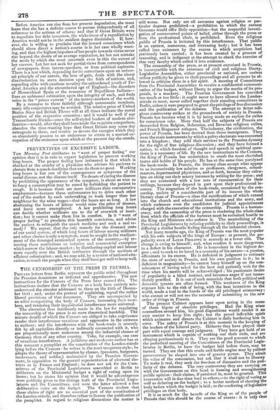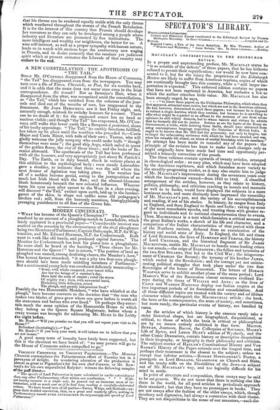THE CENSORSHIP OF THE PRESS IN PRUSSIA. PRIVATE letters from
Berlin represent the public mind throughout the Prussian dominions as irritated and apprehensive. The new instructions for the Censors of the Press have caused this. The instructions declare that the Censors as a body have entirely mis- understood the circular addressed to them on the 24th of Decem- ber 1841 ; and, under the pretext of explaining, repeal the rather liberal provisions of that document. They are accompanied by an edict reorganizing the body of Censors, increasing their num- bers, and rendering their inquisitorial interference more universal.
The alteration thus insidiously made in the law for regulating the censorship of the press is no mere theoretical hardship. The minute details of which the Censors are obliged to take cognizance render their interference vexatious and oppressive in the extreme to authors ; and the interference with the book-trade is severely felt by all capitalists directly or indirectly connected with it, who are proportionally more numerous among the industrial classes of Germany than of any other country. Take, for example, one case of vexatious interference. A judicious and moderate author has at this moment a pamphlet on the constitution of the Landes-stiinde lying before the Censors : he writes in the most temperate style ; he adopts the theory of representation by classes, (peasants, burgesses, landowners, and nobles,) maintained by the Prussian Govern- ment, in opposition to the general representation of electoral dis- tricts as in France and England ; he does not ask for the Com- mittees of the Provincial Legislatures assembled at Berlin to deliberate on the Ministerial budget a right of voting upon its items ; but he states his opinion that it would be advantageous were publicity given to the sittings both of the Provincial Legis- latures and the Committees, and were the latter allowed a free deliberative voice on the budget. The Censors declare that these claims of right are no essential part of the constitution of the Landes-sttinde, and therefore refuse to license the publication of the pamphlet. In regard to religious discussions the matter is still worse. Not only are all sarcasms against religion or par- ticular dogmas prohibited—a prohibition to which the earnest Germans would offer little opposition—but the respectful investi- gation of controverted points of belief, either through the press or from the professional chair, is prohibited. Even the religious public of Prussia is irritated by this interference. That public is an earnest, numerous, and increasing body ; but it has been called into existence by the excess to which scepticism had previously been carried ; it has been created by a process of reasoning, and is indignant at the attempt to check the exercise of that very faculty which called it into existence.
The censorship of the press, as at present exercised in Prussia, is incompatible with the existence of civil and religious liberty. Legislative Assemblies, either provincial or national, are useless unless publicity be given to their proceedings and all persons be al- lowed to criticise them in a fair spirit. A meeting of Committees from the Provincial Assemblies to receive a confidential communi- cation of the budget, without liberty to argue the merits of its pro- posals, is a mockery. The Prussian Government has conceded too much or too little : it ought never to have allowed the Landes- stande to meet, never called together their standing committees in Berlin, unless it were prepared to grant the privilege of free discussion and the publication of the debates. The attempt to fetter reli- gious controversy strikes at the groundwork of society in Prussia. Prussia has become what it is by being made an asylum for exiles for conscience sake. More than half the subjects of Prussia are descended from Belgian, Bohemian, and Bavarian religious exiles, and French Huguenot refugees. Theindustry, the civilization, the power of Prussia, has been derived from those immigrants. They were the main instruments by which a paltry electorate was converted into a kingdom ' - they sold their services to the Prussian dynasty for the right of free religious discussion ; and they have formed a nation, to which freedom of thought and speech in spiritual ques- tions is a necessary of life. By the new instructions to the Censors, the King of Prussia has undertaken to crush the most cherished tastes and habits of his people. He has at the same time paralyzed the book-trade. In Prussia, the literary class accept what appear to us inconceivably low salaries as professors, clergymen, school- masters, departmental physicians, and so forth, because they calcu- late on eking out their scanty incomes by writing for the press ; and they are contented with a low rate of rumuneration for their writings, because they depend in part upon their professional in- comes. The stagnation of the book-trade, occasioned by the cen- sorship, mulcts of a considerable part of its income the whole literary class of Prussia—a class the ramifications of which extend into the church and educational institutions and the army, and which embraces even the candidates for judicial appointments charged with the execution of the censorship. Prussia is a bureau- cracy, and the censorship of the press is rendering the whole class from which the officials of the bureaux must be recruited hostile to the King and Ministers who enforce it. The neutralizing of the Provincial Legislatures by refusing publicity to their proceedings, is diffusing a similar hostile feeling through all the industrial classes.
Not many months ago, the King of Prussia was the most popular with his own subjects of the kings of Europe : at present, the po- pularity even of Louis PHILIPPE is scarcely at a lower ebb. The change is owing to himself; and, what renders it more dangerous, to a defect in his character. He is benevolent in the highest de- gree ; and to seek to be loved is a necessity of his nature—a passion, effeminate in its excess. He is deficient in judgment to estimate the state of society in Prussia, and his own position in it ; he is deficient in magnanimity—he cannot buoy himself up on the con- sciousness of having acted for the best and patiently wait for the time when his merits will be acknowledged ; his passionate desire of popularity is a blind instinct, and becomes anger if not imme- diately gratified. It is out of such materials that both political and domestic tyrants are often formed. This weakness of the King exposes him to the risk of being, with the best intentions in the world, made a tool in the hands of the old privileged aristocracy; who cannot or will not see the necessity of submitting to the new order of things in Prussia. The present Cabinet appears bent upon acting in the sense of these bigots of obsolete privileges. Had the King wiser counsellors around him, his good dispositions would render it an easy matter to keep him right ; but the proud inflexible spirit which animates and directs the Cabinet is daily hardening him in error. The safety of Prussia is at this moment in the keeping of the leaders of the Liberal party. Hitherto they have played their part with equal courage and judgment. They have got hold of an instrument which is capable of working out their ends, and are clinging pertinaciously to it. They see the good account to which the periodical meeting of the Committees of the Provincial Legis- latures in Berlin, to have the budget laid before them, may be turned. They see that this crude and feeble engine may by patient perseverance be shaped into one of greater power. They admit the value of the concession, but ask that it shall not be illusory To make it real, they seek the freedom of discussion and the pub- licity of the debates. The very controversy they are carrying on with the Government on this head is forming and strengthening public opinion : their claims, if persisted in, must be granted. This concession will in due time lead to others,—to the right of voting as well as debating on the budget ; to a better method of electing the body before which the budget is laid; to the conferring of legislative privileges on that body.
It is as much for the benefit of the King as of the people of Prussia that this should be the course of events : it is only thea that his throne can be rendered equally stable with the only throne which weathered throughout the storms of the French Revolution. It is for the interest of this country that Prussia should develope her resources as they can only be developed among a people where industry and literature are promoted by free institutions. The more intelligent and wealthy our neighbours, the better for us. A wise self-interest, as well as a proper sympathy with human nature, leads us to watch with anxious hope the controversy now waging in Prussia, and to desire earnestly that the resolute yet judicious spirit which at present animates the Liberals of that country may endure to the end.



























 Previous page
Previous page